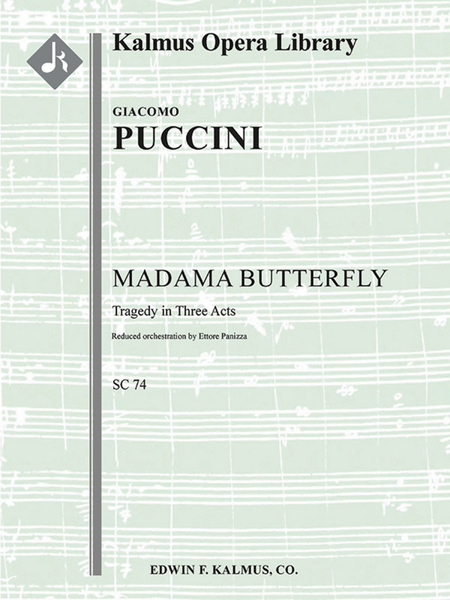Madama Butterfly (complete opera in 3 acts; reduced orchestration)
-
Ships in 6 to 8 weeks
Details
Description
SKU: AP.36-A617502
By Giacomo Puccini, Giuseppe Giacosa, based on the short story "Madame Butterfly" (1898) by John Luther Long, and ed./arr. by Ettore Panizza/ Libretto by Luigi Illica. Serious Opera, Orchestra Accompaniment, Conductor Score & Parts. Kalmus Opera Library. Score and Part(s). LudwigMasters Publications #36-A617502. Published by LudwigMasters Publications (AP.36-A617502).UPC: 659359786761. English. Giacomo Puccini; ed./arr. by Ettore Panizza/ Libretto by Luigi Illica; Giuseppe Giacosa; based on the short story "Madame Butterfly" (1898) by John Luther Long.
Madama Butterfly, one of the most popular operas of Giacomo Puccini (1858-1924), is the story of the conflicting expectations of Lieutenant Pinkerton, an American naval officer, and Madame Butterfly (Cio-Cio San), who marry while Pinkerton is stationed in Nagasaki. Pinkerton intends to divorce Butterfly when he returns to the United States, but she believes that the marriage will last forever. When Pinkerton returns to Japan with his new wife Kate, Butterfly commits seppuku with her father's knife after placing an American flag in the hand of her son. The opera contains one of the repertoire's best known soprano arias, Un bel di, vedremo in which Butterfly longs for Pinkerton to return to Japan. The original premiere of a version in two acts on February 17, 1904 at La Scala in Milan was a disaster, resulting in Puccini withdrawing that version and substantially rewriting the opera. The second version was in three acts, and it premiered on May 28, 1904 in Brescia to much greater success. In 1906 and 1907, Puccini created a third and fourth version for the Metropolitan Opera in New York and for Paris respectively. Finally, again in 1907, Puccini made the final revisions to the opera for a fifth version, and this is the one most often performed today, referred to as the Standard Version. This version is for reduced orchestra by Ettore Panizza. Instrumentation: 2(2d.Picc).1.2.1: 2.2.1.0: Timp.Perc(6-7): Hp: Str(4-4-3-3-3 in set): Banda(Perc.(5).Viola d'amore): Vocal soli (14 roles, SSSAAATTTBBBBB): Chorus.
These products are currently being prepared by a new publisher. While many items are ready and will ship on time, some others may see delays of several months.

 Share
Share